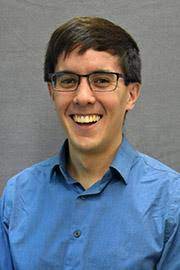CRISP faculty award winners announced
CRISP faculty award winners announced
| Author: | Saurabh Bagchi |
|---|---|
| Event Date: | April 7, 2021 |
Zoom recording of the event: Link
Process: There were 4 panelists evaluating the submitted nominations. Each independently rated the nominations comprising the vision statement and the bio, i.e., one was not aware of the ratings of the others. These ratings were then tabulated with equal weight to each panelist.
There were 4 criteria for the evaluation: Thrust (alignment with one of the three thrusts of CRISP), Originality of vision, Feasibility of vision, Track record
These were equally weighted.
|
Tiark Rompf "Outstanding Star" Winner |
David Inouye "Rising Star" Winner |
Tiark Rompf
Winner of the "Outstanding Star" category award
A highlight mentioned by a panelist from Tiark's winning nomination:
This represents a radical rethinking of the role of high-level and low-level programming languages under the paradigm of generative programming: the central idea is to focus the abstraction power of high-level languages on composing pieces of low-level code, making runtime code generation and domain-specific compiler optimization a fundamental part of the system logic. There is compelling evidence of impact that has happened or is unfolding, such as with domain-specific language called Delite. The winner is influencing the performance and the resilience of programming systems through his generative programming approach, with his impact being felt in as widespread areas as architecture, databases, machine learning, and security. One example accomplishment is on the new AutoGraph front-end in TensorFlow 2.0, the result of a collaboration with Google Brain, which is directly based on his ideas adapted from Scala to Python, reconciling a convenient imperative programming interface with extraction of computational graphs for optimization and targeting of GPU and TPU accelerators.
David Inouye
Winner of the "Rising Star" category award
A highlight mentioned by a panelist for David's winning nomination:
Deep learning has revolutionized our world with major headline-grabbing successes in areas such as computer vision, natural language processing, and speech recognition. However, many of modern AI systems lack resilience in dynamic real-world settings in part because 1) they do not align with human understanding, which importantly incorporates causality and context, or 2) they cannot handle changes of the input data distribution known as distribution shifts.
The winner's work is moving us towards a deeper understanding of modern deep models by explaining them and then determining distribution shift in the data. There is evidence and promise that this work is fundamental for both developing and deploying resilient ML systems. One of his two thrusts explained in the nomination is making explainability of ML models as a first order citizen at the same level as modeling accuracy. Explaining the predictions of machine learning models has become increasingly important for many crucial applications such as healthcare, recidivism prediction, or loan assessment. The winner's work is developing the idea of explanations based on feature importance.



